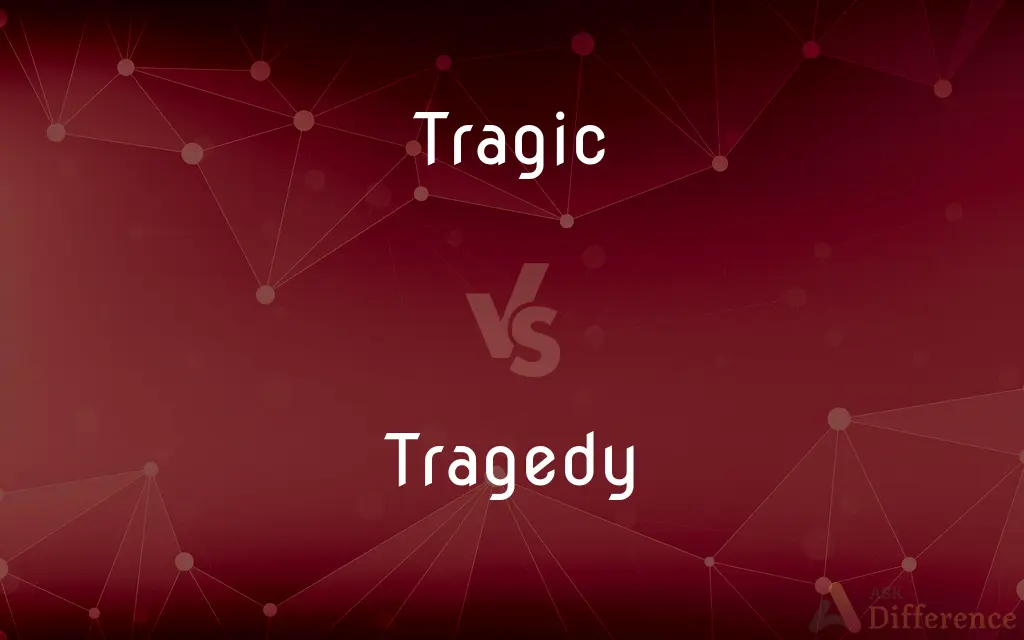Tragic vs. Tragedy — What's the Difference?
By Fiza Rafique & Urooj Arif — Updated on March 4, 2024
Tragic refers to something causing great sadness or distress, often linked to disastrous events, while tragedy is a genre of drama based on human suffering that invokes an accompanying catharsis.

Difference Between Tragic and Tragedy
Table of Contents
ADVERTISEMENT
Key Differences
Tragic is an adjective that describes situations, events, or circumstances that result in profound sadness, distress, or disaster. It emphasizes the emotional impact or the nature of a situation that leads to sorrow or misfortune. On the other hand, tragedy is a noun that specifically refers to a form of drama or literature that deals with sorrowful or disastrous events and often ends in disaster for the main characters, typically evoking a sense of catharsis or emotional release for the audience.
While tragic can apply broadly to any situation that is sorrowful or disastrous, tragedy is rooted in the arts and literature, representing a structured narrative form. Tragedies are designed to elicit strong emotional responses from the audience, allowing them to experience pity and fear, ultimately leading to a sense of relief or purification. Conversely, tragic events do not necessarily follow a narrative structure and can occur in real life without any sense of resolution or catharsis.
Tragic can also describe a flaw or characteristic that leads to someone's downfall, often used in the context of literature or storytelling to describe a hero's tragic flaw. Tragedy, however, encompasses the entire narrative arc that includes this flaw, the ensuing struggle, and usually the downfall of the protagonist, highlighting the interplay between character and fate.
The scope of tragic is wider, encompassing not only literature and drama but also real-life events and personal experiences that evoke sadness or despair. Tragedy, while it can be used metaphorically to describe real-life events, primarily remains a genre that follows specific conventions and aims to provide a moral lesson or philosophical insight through the depiction of suffering.
Comparison Chart
Definition
Describes something causing great sadness or distress
A genre of drama based on human suffering
ADVERTISEMENT
Context
Can be used broadly across various situations
Primarily used in arts, literature, and drama
Emotional Impact
Focuses on the emotional response to events
Invokes catharsis through the depiction of suffering
Structure
Adjective, describing situations or characteristics
Noun, referring to a structured narrative form
Scope
Broad, encompassing any sorrowful or disastrous event
Specific to the arts, with established conventions
Compare with Definitions
Tragic
Evoking pity or despair.
The outcome of their love was tragic.
Tragedy
A genre of drama depicting suffering.
Shakespeare's Hamlet is a classic tragedy.
Tragic
Causing great sadness.
The news of the accident was tragic.
Tragedy
A work of art that invokes catharsis.
The play's tragedy moved the audience to tears.
Tragic
Pertaining to a tragic flaw.
His overconfidence was his tragic downfall.
Tragedy
Events causing great suffering or loss.
The earthquake was a national tragedy.
Tragic
Disastrous or calamitous.
The environmental disaster was a tragic reminder of human impact.
Tragedy
The dramatic representation of the downfall of a protagonist.
The tragedy explored the hero's fatal flaw.
Tragic
Involving disaster.
A tragic event shook the small community.
Tragedy
A narrative with a sad or disastrous conclusion.
The novel unfolds as a modern tragedy.
Tragic
Relating to or characteristic of dramatic tragedy or tragedies
Tragic plays.
The tragic hero.
Tragedy
Tragedy (from the Greek: τραγῳδία, tragōidia) is a genre of drama based on human suffering and, mainly, the terrible or sorrowful events that befall a main character. Traditionally, the intention of tragedy is to invoke an accompanying catharsis, or a "pain [that] awakens pleasure", for the audience.
Tragic
Causing great sadness or suffering.
Tragedy
A drama or literary work in which the main character is brought to ruin or suffers extreme sorrow, especially as a consequence of a tragic flaw, moral weakness, or inability to cope with unfavorable circumstances.
Tragic
Of or pertaining to tragedy; of the nature or character of tragedy; as, a tragic poem; a tragic play or representation.
Tragedy
The genre made up of such works.
Tragic
A tragedy; a tragic drama.
Tragedy
A drama or similar work, in which the main character is brought to ruin or otherwise suffers the extreme consequences of some tragic flaw or weakness of character.
Tragedy
An event resulting in great loss and misfortune;
The whole city was affected by the irremediable calamity
The earthquake was a disaster
Common Curiosities
How does a tragic flaw contribute to tragedy?
A tragic flaw is a character trait that leads to the protagonist's downfall within a tragedy, highlighting the interplay between character, fate, and the inevitability of suffering.
Can real-life events be considered tragedies?
Yes, real-life events causing significant suffering or loss can metaphorically be considered tragedies, especially if they evoke a profound emotional response similar to that experienced in dramatic tragedies.
Is the term tragic applicable only to disaster?
While often associated with disaster, tragic can describe any situation that causes great sadness or distress, including personal setbacks or failures.
What is the essence of a tragedy in literature?
In literature, a tragedy involves a narrative that depicts human suffering, leading to the downfall of the protagonist, typically evoking a cathartic experience for the audience.
Can a tragedy be based on true events?
Yes, tragedies can be inspired by true events, though they are often dramatized or fictionalized to fit the narrative structure and thematic requirements of the genre.
Do all tragedies end with disaster?
While many tragedies end in disaster, the defining feature is the depiction of suffering and the emotional impact on the audience.
What makes an event tragic rather than simply unfortunate?
An event is considered tragic rather than unfortunate when it involves a profound loss or suffering that evokes a deep emotional response, often tied to a sense of inevitability or fatalism.
How does one distinguish between a tragic event and a tragedy in drama?
A tragic event is a real or fictional occurrence causing sadness or distress, while a tragedy in drama refers to a structured narrative genre that explores human suffering and seeks to evoke catharsis.
What defines a situation as tragic?
A situation is defined as tragic if it results in great sadness, distress, or disaster, often unexpectedly or through a significant loss.
How does tragic differ from tragicomic?
Tragicomic works blend elements of tragedy and comedy, offering a more nuanced or complex emotional experience, whereas tragic strictly pertains to events or characteristics causing sadness or despair.
How do tragic events influence society?
Tragic events can have a profound impact on society, prompting reflection, communal mourning, changes in policy or behavior, and a reevaluation of values or beliefs.
Can the term tragic apply to situations with a silver lining?
Yes, situations can be described as tragic even if they have a silver lining, as the term emphasizes the presence of profound sadness or loss, regardless of any subsequent positive outcomes or revelations.
Can tragedies have a positive impact on audiences?
Yes, tragedies aim to provide catharsis, allowing audiences to experience and release strong emotions, which can lead to a sense of relief, insight, or even moral or philosophical enlightenment.
Is the impact of a tragedy universal?
While tragedies aim to evoke universal emotions, individual responses can vary based on personal experiences, cultural background, and emotional sensitivity.
Can a character in a tragedy be responsible for their own downfall?
Yes, a central theme in many tragedies is the protagonist's responsibility for their own downfall, often through a tragic flaw or failure to heed warnings.
Share Your Discovery

Previous Comparison
Cumin vs. Jeera
Next Comparison
Hierarchal vs. HierarchicalAuthor Spotlight
Written by
Fiza RafiqueFiza Rafique is a skilled content writer at AskDifference.com, where she meticulously refines and enhances written pieces. Drawing from her vast editorial expertise, Fiza ensures clarity, accuracy, and precision in every article. Passionate about language, she continually seeks to elevate the quality of content for readers worldwide.
Co-written by
Urooj ArifUrooj is a skilled content writer at Ask Difference, known for her exceptional ability to simplify complex topics into engaging and informative content. With a passion for research and a flair for clear, concise writing, she consistently delivers articles that resonate with our diverse audience.














































